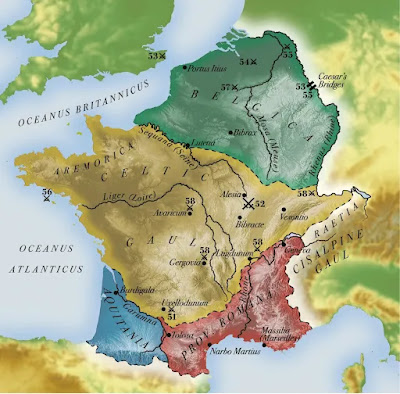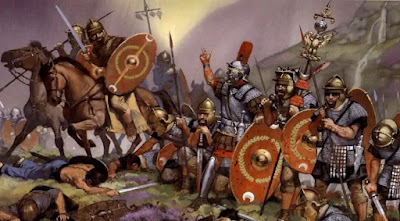How often do you think of the Roman Empire? It’s not just a question; these days it’s a meme, mocking dreamers in no hurry to grow up. Imagining a world brought into clearer order is tempting. Reading about it as it happens can satisfy the hopelessly boyish at heart.
Julius Caesar had no such agenda when writing these episodic narratives of his conquests across France and parts beyond. His objective was political. Romans had long suffered from barbarian attacks. Now Caesar was doing something about it, at a time when his main rival Pompey enjoyed a 20-year head start conquering the rest of the known world.
Caesar sought glory and dictatorship. What he achieved instead was a work of history that would endure in Western culture long after the empire he helped to build had collapsed into ruins and darkness.
More than a military memoir, Commentarii de Bello Gallico is a fascinating self-portrait of a man who enjoyed consummate ability as strategist, tactician, politician, diplomat, publicist and writer.
Caesar justified his initial incursion into Gaul as reaction to a threatened invasion of the Province, a Roman holding corresponding to today’s Provence region of France. The Province connected the Roman Republic to their possessions in Spain. The Helvetii had in living memory invaded the Province to inflict much damage and death, so Caesar’s determination to hold the line against them in 58 BC must have made welcome reading:
Hearing of my arrival, the Helvetii sent an embassy of their most distinguished citizens… with instructions to say that their intention was to pass through the Province without doing any damage, simply because they had no alternative route. They asked me to agree to their doing so. But I remembered that the consul Lucius Cassius had been killed by these Helvetii, and his army routed and sent under the yoke. So I thought no concession should be made.
The best defense proved to be a vigorous and constant offense, to the point of enforced subjugation. While Caesar makes a couple of early mentions of respecting Gallic sovereignty, the tone gradually shifts into one of unapologetic conquest, where tribes willing to play ball get special privileges and others must give up hostages as guarantors of their good behavior. For Romans of the Province and elsewhere, such aggressive foreign policy must have been welcome.
The Conquest Of Gaul, this 1980 translation of Caesar’s commentaries, is an odd work. In the spirit of postmodernism, it is written in a less formal voice than one usually gets from Classical scribes. Most glaring is the inclusion of a first-person narrative. As Asterix fans know, Caesar referred to himself in the royal third person. Here he talks about himself as “I” and “me,” as exampled in the above passage.
This intrusion of a more modern sensibility can be jarring. Still, it gives this translation an immediacy in line with its original intent.
Speaking of Asterix, fans of the comic will know this book from its famous opening line, which is requoted in the preamble of many Asterix books. Here again, though, the translation renders it slightly off: “Gaul as a whole consists of three separate parts: one is inhabited by the Belgae, another by the Aquitani and the third by the people we call Gauls, though in their own language they are called Celts.”
The first two (of eight) books detail Caesar’s conquests of these separate parts, accomplished as much by diplomacy as by the sword. In his own telling, he is ruthless in attack and merciful in victory.
His opponents, Caesar makes clear time and again, were formidable. Against the Nervii in 57 BC, he paints a fearsome portrait of what his soldiers faced:
But the enemy showed enormous courage even though their hopes of survival were almost gone; When their front lines had fallen, those behind stepped forward onto the bodies and fought from there. They too were brought down and the corpses piled up, but the survivors moved up and, as if from the top of a mound, kept on hurling their spears, intercepting our javelins and flinging them back at us.
Visceral word portraits like this do much to explain the lasting appeal of Caesar’s commentaries. So do the diverse territories he invaded.
After conquering if not quite subduing Gaul, Caesar sets his sights on other lands. Across the Rhine River lay Germany, whose tribes had an even fiercer reputation. “The Gauls said that often when they had encountered the Germans they had not been able to endure even the expression on their faces or the glare of their eyes,” Caesar explains.
Beyond the northern Atlantic coast lay Britannia, a land known only faintly to Caesar from trade reports. He describes such strange British customs as riding chariots into battle and sharing wives with fathers and brothers. “They think it wrong to eat hares, chickens, or geese, keeping those creatures only for pleasure and amusement,” he notes.
By the time he attacks England, any self-defense justification for conquest is gone. Caesar was doing battle of another kind now, with Pompey in the realm of public opinion, Pompey won fame for victories in such far-off places as Judea and Asia Minor. Caesar must have seen England as his shortcut to Rome.
If so, he thought wrong. His English expedition proved a rare failure for Caesar. He struggled against the chariots particularly:
Generally they succeed in throwing the ranks of their opponents into confusion just with the terror caused by their galloping horses and the din of the wheels. They make their way through the squadrons of their own cavalry, then jump down from their chariots and fight on foot. Meanwhile the chariot-drivers withdraw a little way from the fighting and position the chariots in such a way that if their masters are hard pressed by the enemy’s numbers, they have an easy means of retreat to their own lines.
The real issue for Caesar wasn’t defeating these woad-painted foes, but keeping them down when he and his troops sailed back to the continent. The business of conquering England would challenge Rome for most of the next century.
The incursion into Germany was no less of a feat. Caesar describes how his engineers laid a bridge across the Rhine, which then enabled a rolling-up and wholesale massacre of Germans found there. This is justified in his telling by a German attack on the Romans in Gaul, conducted under the cover of truce. Caesar details the bloody fate of an Aquitanian cavalryman who rode for Rome.
Caesar largely writes about battles in the same mile-high way ancients often did, troops smiting one another in the tens of thousands. Occasionally though, he zooms in for a closer view, like when he singles out a couple of Roman centurions rescuing each other in battle to prove which of them is the better warrior. It’s dynamic, pleasing stuff, right out of Dumas.
Titus Labienus, one of Caesar’s lieutenants, rallies his forces against the Treveri by invoking their commander: “Here is the chance you’ve been looking for. You’ve got the enemy in your grasp, and they are in a bad position and on unfavourable ground. Show the same courage now, under my command, as you have often shown under the commander-in-chief. Imagine he is here, watching all this in person.”
Caesar
plugs himself shamelessly both as an inspiration and a brave leader. Before one
battle, he sends his horse away to shun retreat. During another, he wears his
distinctive robes at the front lines. His legendary cunning and forethought on the field take centerstage throughout.
When Roman reverses do occur, he blames others. The annihilation of an entire legion is laid at their dead commander, Sabinus, not the general who put the legion so far away from help. At Gergovia, Caesar’s last defeat, a headstrong centurion charges the enemy walls against Caesar’s orders. Caesar later uses this as a learning exercise to counsel obedience.
This episode occurs in the seventh of the eight books, the last Caesar wrote and the most dramatic. This culminates in the famous siege of Alesia, where Caesar trapped the fabled Gallic commander Vercingetorix on a plateau while surrounded himself by a large Gallic relief force.
“The battle was being fought in full view of everyone, and it was impossible for any brave deed or act of cowardice to escape notice,” Caesar writes. Two-way ramparts were constructed and thinly manned, while Caesar rode everywhere plugging holes with his scant reserves.
While Caesar makes clear the Gauls were no match for Roman bravery, he credits their ample fighting spirit. He understood the value of talking up their merits, even presenting their sound reasons for resisting him:
The Gauls already resented being subject to the sovereignty of Rome; they now thought their chance had come, and it spurred them on to start planning more boldly and openly for war.
The last volume was written by one of Caesar’s lieutenants years later. It details the final collapse of Gallic resistance at Uxellodunum in 50 BC, but without the vigor that illuminates Caesar’s own account.
“When the gods wish to take vengeance on humans for their crimes, they usually grant them, for a time, considerable success and quite a lengthy period of impunity, so that when their fortunes are reversed they will feel it more bitterly.”
Caesar’s above remark to one of his first Gallic foes might be laid at the feet of the speaker
himself, who would ultimately perish trying to rule over Rome six years after his French triumph. Still, The Battle
Of Gaul makes clear that however tragic his fate, he was a rare one with a knack for making his life into the stuff of dreams.








No comments:
Post a Comment